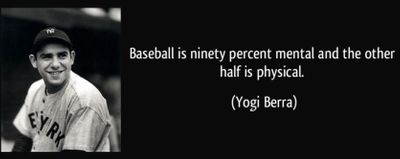"Baseball is half physical, the other 90% is mental" - Yogi Berra
I usually ask athletes I'm speaking with what percent of their performance is due to their mental game. I'm always surprised because they usually say that their performance is about 90% mental. Yet in asking them how much they invest in mental preparation very few ever say they do any mental preparation, though they'll spend thousands of dollars on equipment, supplements, coaching, etc.
As we've been discussing, mindful practice is a great mental skill that enables you to be "in the zone" or in a flow state where you're absorbed in the present moment and perform your best. Mindfulness skills provide practical and proven ways to focus on your performance, to ignore distracting thoughts and to avoid getting consumed in “What if?” scenarios. With mindfulness you are able to stay in the present, at your best.
Last week Lucy (of the cartoon "Peanuts") said that she dropped the ball because she let "the past get in her eyes" thinking about all the errors she had made before. As with Lucy, our self-talk is one of the major ways that the past gets in our eyes. How many of us look at a past bike ride we had that didn't go well and let the memory drag us down? Or compare what we can do to someone else and tell ourselves that we'll never be as good?
Negative self-talk or critical thinking rarely offers us anything good, it usually isn't accurate and certainly doesn't predict what we're capable of, especially when we give it our all. Often the critical things that go through our minds are rooted in the past and have been there so long that we are often not even aware of them, we just notice the feeling they leave behind in a situation.
I remember one morning before a 70.3 race when we could see whitecaps in the water as the sun started coming up. A friend I was with became so nervous because of what she saw that she nearly got sick. When I reminded her that she'd swum in water worse than that, that she is a skilled swimmer and that the race organizers weren't going to let people drown, my friend began to settle down; the fear statements that were going through her mind were neutralized by the countering thoughts that I offered.
While this type of approach can work, and is often helpful, it's kind of like arguing with ourselves in that the initial thoughts are examined and challenged to basically prove them wrong. Sometimes we can actually wind up getting more connected to the negative thoughts.
Mindfulness offers us a powerful approach that we can use to disarm our negative thoughts and offers the advantage of keeping us from getting tied up in them as we just notice or observe our thoughts.
As a first step, use your mindfulness skills to notice all that you are saying to yourself about a situation you currently face and want to prepare for (like a race or a hard workout). You can also do this to turn towards feelings from the past that keep intruding in your mind. Mindfulness is an especially helpful way to "tune in" as self-talk often comes from old and somewhat automatic patterns of thinking. Tune in even to the stories that you tell others as you may find that these reflect your mental state more than you realize.
When you notice negative thoughts, maybe like "I'll never be able to do it" or "I'm not as good as the others" or "I hope I don't miss the goal", just notice them. They are not truth. They are merely thoughts. As when you meditate, you can simply label these as "thinking".
Notice the thoughts, but don't judge them. Don't argue with them or become attached to them. Don't take them with you into your next shot, or play or ride. They are merely thoughts that you become aware of. You can them let pass through your mind just as you would with any thought you notice when you're being mindful.
As an example, a thought like "I can't finish this race" could be seen this way: "right now I'm having the thought that I can't finish the race, but this isn't truth, it's just a thought and I'll keep trying my best."
When you simply watch or observe your thoughts come and go, rather than latch onto them and overthink them, you are better able to focus on your performance rather than letting distracting negative thoughts drive feelings such as anxiety.
As you let those thoughts flow away, try replacing them with thoughts about what you will do, with thoughts about what you want to achieve. You may even want to try to practice visualizing the unwanted thoughts flowing away (or maybe floating away?), with the new thought coming into its place. You can even visualize a scene representing the new thought of what you want to achieve.
With the use of your mindfulness skills, and some practice, you'll come to find that when those negative thoughts come up, they'll have less and less power to distract you from your peak performance.
Stay present.
Dave Marks, LCPC 847-299-3400
marksassociates@email.com

